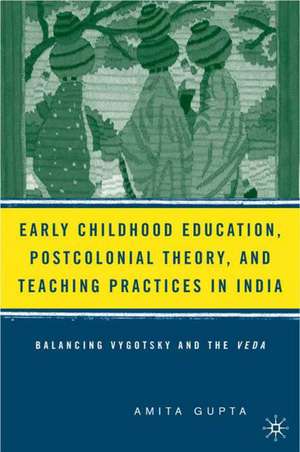Early Childhood Education, Postcolonial Theory, and Teaching Practices in India: Balancing Vygotsky and the Veda
Autor A. Guptaen Limba Engleză Hardback – 19 mai 2006
| Toate formatele și edițiile | Preț | Express |
|---|---|---|
| Paperback (2) | 299.09 lei 3-5 săpt. | |
| Palgrave Macmillan US – 18 dec 2015 | 299.09 lei 3-5 săpt. | |
| Palgrave Macmillan US – 17 sep 2013 | 302.20 lei 3-5 săpt. | |
| Hardback (1) | 535.45 lei 3-5 săpt. | |
| Palgrave Macmillan US – 19 mai 2006 | 535.45 lei 3-5 săpt. |
Preț: 535.45 lei
Preț vechi: 582.00 lei
-8% Nou
Puncte Express: 803
Preț estimativ în valută:
102.47€ • 106.59$ • 84.60£
102.47€ • 106.59$ • 84.60£
Carte disponibilă
Livrare economică 24 martie-07 aprilie
Preluare comenzi: 021 569.72.76
Specificații
ISBN-13: 9781403971142
ISBN-10: 1403971145
Pagini: 256
Ilustrații: XVI, 256 p.
Dimensiuni: 140 x 216 x 24 mm
Greutate: 0.42 kg
Ediția:2006
Editura: Palgrave Macmillan US
Colecția Palgrave Macmillan
Locul publicării:New York, United States
ISBN-10: 1403971145
Pagini: 256
Ilustrații: XVI, 256 p.
Dimensiuni: 140 x 216 x 24 mm
Greutate: 0.42 kg
Ediția:2006
Editura: Palgrave Macmillan US
Colecția Palgrave Macmillan
Locul publicării:New York, United States
Cuprins
Preface Conceptualizing and Setting the Stage The Socio-cultural Context of Education in India: Core Concepts of Philosophy Underlying the Worldview of Indians Educational Systems in India: Past and Present Aims of Education Contextualized within Urban Indian Society The Image, Roles and Responsibilities of the Early Childhood Teacher in India The Image of the Child: What Is Developmentally and Socially Appropriate for Children Growing up in Indian Society? Learning to Teach: A Socio-cultural-historical Constructivist Theory of Teaching Contextualizing and Demystifying the Challenges of Large Class Size in India A Socio-culturally Constructed Early Childhood Postcolonial Curriculum: The Interfacing of Three Culturally Different Educational Discourses Aligning Teacher Education and Early Childhood Practice in India: Balancing Vygotsky and the Veda Reflecting on the Process of Early Childhood Postcolonial Research
Recenzii
"Amita Gupta explores the cultural philosophies that underwrite Indian educational theory, drawing attention to the relationship between Indian thought and Western theories of early childhood education. Gupta's richly descriptive and sophisticated book contextualizes Indian educational pedagogy within its broader cultural and historical context, and in doing so, she provides illuminating and useful insights that are relevant to all concerned with global education." - James Davison Hunter, LaBrosse-Levinson Distinguished Professor of Religion, Culture, and Social Theory, and Executive Director, Institute for Advanced Studies in Culture, University of Virginia, USA
"Amita Gupta has given us an extraordinary book. She shows vividly how we in the West can learn, not only from our own traditions of developmental theory, but from the teaching practices of many in India. This study displays the extent to which the colonial tradition, in which the subordinated peoples of Asia, Latin America, and Africa draw from the fruits of so-called Western Civilization, can be reversed. The postcolonial world may be on the brink of civilizing us and Gupta shows how it might happen in one of the most vital sectors of education, early childhood. She demonstrates that traditional practices are not necessarily conservative, and in this very important instance, are surely progressive, if by that term we mean that children's needs come first and that teaching is, first of all, a way to validate how children teach themselves." - Stanley Aronowitz, Distinguished Professor of Sociology, City University of New York Graduate Center, USA
"Amita Gupta gives an instructive outlook on the pedagogies that are nowadays used in Indian middle-class homes and in private schools . . . She succeeds in describing and analyzing from a Vygotskian perspective how the Indian early childhood educators concerned are trying to prepare their students for citizenship in the twenty-first century." - Jacques Carpay, Professor Emeritus, Educational Studies, Free University Amsterdam
"Amita Gupta's book looks at the teaching practices of early childhood practitioners in urban India and positions them within a socio-cultural, postcolonial context. She reminds us, as Gandhi observed, that what counts in the West as marginalized is in fact dominant in the non-West. In the age of globalization, this book provides a different mirror in which early childhood practitioners can reflect upon their work." - Susan Semel, Professor, The City College of New York and The Graduate Center, The City University of New York, USA
"This book is unique in drawing connections between education and an Eastern worldview, using the early education of children in India as a touchstone. In this edition the author enhances her use of the framework in this book as a lens for examining education and planning research, gives us deeper insight into her research methodology, and updates the changes she sees in the global conception of early childhood education. It is a very important contribution to our work in the United States in early childhood education. We need to be able to look across cultures to find best practices in this field that unlock futures for children, and Amita Gupta's book provides the vehicle for doing just that." - Nicholas Michelli, Presidential Professor, PhD Program in Urban Education, The Graduate Center, The City University of New York, USA
"Both accessible and thought-provoking, this work has provided an opportunity for my graduate students to reflect and reconsider taken-for-granted principles in early childhood education curriculum and pedagogy within the history and diverse cultural context of our local environment." - Sirene Lim, National Institute of Education, Nanyang Technological University, Singapore
"This is an important book for early childhood educators and academics across the globe. Based on original empirical research and drawing on postcolonial perspectives, it offers unique insights into contemporary policy and practice in early childhood in India, which in turn require us to reflect carefully on our own cultural practices and assumptions. The author writes in a highly engaging and accessible way, successfully combining theory and practice in ways which inform and challenge the reader. In the global village of early childhood education, this is essential reading!" - Sue Rogers, Head of Early Years and Primary Education, Institute of Education, University of London, UK
"Amita Gupta has given us an extraordinary book. She shows vividly how we in the West can learn, not only from our own traditions of developmental theory, but from the teaching practices of many in India. This study displays the extent to which the colonial tradition, in which the subordinated peoples of Asia, Latin America, and Africa draw from the fruits of so-called Western Civilization, can be reversed. The postcolonial world may be on the brink of civilizing us and Gupta shows how it might happen in one of the most vital sectors of education, early childhood. She demonstrates that traditional practices are not necessarily conservative, and in this very important instance, are surely progressive, if by that term we mean that children's needs come first and that teaching is, first of all, a way to validate how children teach themselves." - Stanley Aronowitz, Distinguished Professor of Sociology, City University of New York Graduate Center, USA
"Amita Gupta gives an instructive outlook on the pedagogies that are nowadays used in Indian middle-class homes and in private schools . . . She succeeds in describing and analyzing from a Vygotskian perspective how the Indian early childhood educators concerned are trying to prepare their students for citizenship in the twenty-first century." - Jacques Carpay, Professor Emeritus, Educational Studies, Free University Amsterdam
"Amita Gupta's book looks at the teaching practices of early childhood practitioners in urban India and positions them within a socio-cultural, postcolonial context. She reminds us, as Gandhi observed, that what counts in the West as marginalized is in fact dominant in the non-West. In the age of globalization, this book provides a different mirror in which early childhood practitioners can reflect upon their work." - Susan Semel, Professor, The City College of New York and The Graduate Center, The City University of New York, USA
"This book is unique in drawing connections between education and an Eastern worldview, using the early education of children in India as a touchstone. In this edition the author enhances her use of the framework in this book as a lens for examining education and planning research, gives us deeper insight into her research methodology, and updates the changes she sees in the global conception of early childhood education. It is a very important contribution to our work in the United States in early childhood education. We need to be able to look across cultures to find best practices in this field that unlock futures for children, and Amita Gupta's book provides the vehicle for doing just that." - Nicholas Michelli, Presidential Professor, PhD Program in Urban Education, The Graduate Center, The City University of New York, USA
"Both accessible and thought-provoking, this work has provided an opportunity for my graduate students to reflect and reconsider taken-for-granted principles in early childhood education curriculum and pedagogy within the history and diverse cultural context of our local environment." - Sirene Lim, National Institute of Education, Nanyang Technological University, Singapore
"This is an important book for early childhood educators and academics across the globe. Based on original empirical research and drawing on postcolonial perspectives, it offers unique insights into contemporary policy and practice in early childhood in India, which in turn require us to reflect carefully on our own cultural practices and assumptions. The author writes in a highly engaging and accessible way, successfully combining theory and practice in ways which inform and challenge the reader. In the global village of early childhood education, this is essential reading!" - Sue Rogers, Head of Early Years and Primary Education, Institute of Education, University of London, UK
Notă biografică
Amita Gupta is a Fulbright Research Scholar, Associate Professor at the City College of New York, and Doctoral Faculty for the Urban Education Program at the CUNY Graduate Center.









